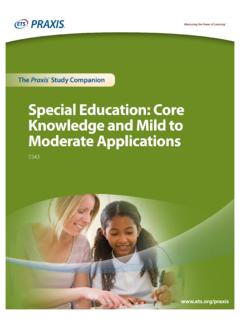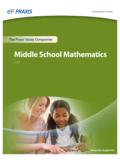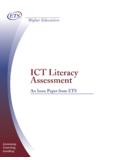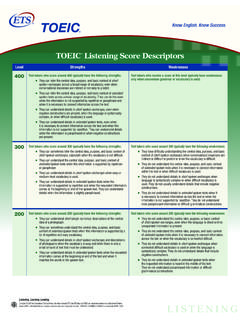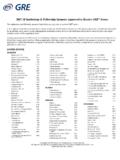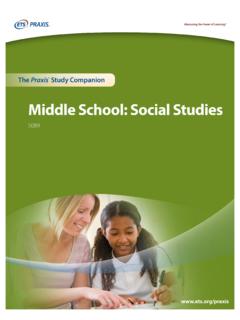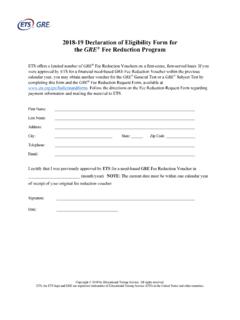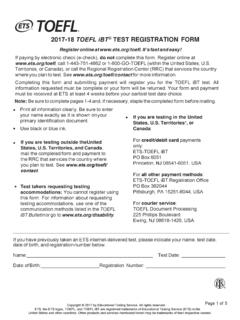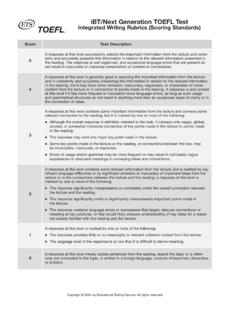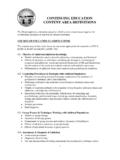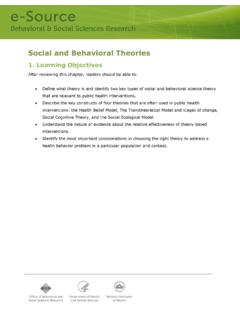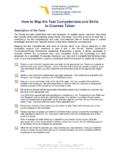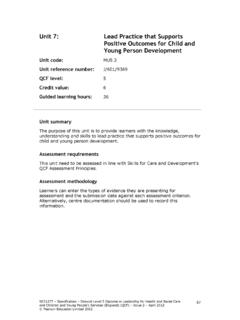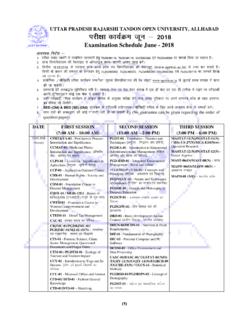Transcription of Pre-Kindergarten Education Study Companion
1 Pre-Kindergarten Education Praxis Study CompanionThe Praxis Study Companion2 Welcome to the Praxis Study CompanionWelcome to The Praxis Study Companion Prepare to Show What You KnowYou have been working to acquire the knowledge and skills you need for your teaching career. Now you are ready to demonstrate your abilities by taking a Praxis test. Using the Praxis Study Companion is a smart way to prepare for the test so you can do your best on test day. This guide can help keep you on track and make the most efficient use of your Study Study Companion contains practical information and helpful tools, including: An overview of the Praxis tests Specific information on the Praxis test you are taking A template Study plan Study topics Practice questions and explanations of correct answers Test-taking tips and strategies Frequently asked questions Links to more detailed informationSo where should you start?
2 Begin by reviewing this guide in its entirety and note those sections that you need to revisit. Then you can create your own personalized Study plan and schedule based on your individual needs and how much time you have before test in mind that Study habits are individual. There are many different ways to successfully prepare for your test. Some people Study better on their own, while others prefer a group dynamic. You may have more energy early in the day, but another test taker may concentrate better in the evening. So use this guide to develop the approach that works best for teaching career begins with preparation. Good luck!Know What to ExpectWhich tests should I take? Each state or agency that uses the Praxis tests sets its own requirements for which test or tests you must take for the teaching area you wish to you register for a test, confirm your state or agency s testing requirements at are the Praxis tests given?
3 Praxis tests are given on computer. Other formats are available for test takers approved for accommodations (see page 50).The Praxis Study Companion3 Welcome to the Praxis Study CompanionWhat should I expect when taking the test on computer?When taking the test on computer, you can expect to be asked to provide proper identification at the test center. Once admitted, you will be given the opportunity to learn how the computer interface works (how to answer questions, how to skip questions, how to go back to questions you skipped, etc.) before the testing time begins. Watch the What to Expect on Test Day video to see what the experience is and when are the Praxis tests offered?You can select the test center that is most convenient for you. The Praxis tests are administered through an international network of test centers, which includes Prometric Testing Centers, some universities, and other locations throughout the schedules may differ, so see the Praxis web site for more detailed test registration information at The Praxis Study Companion4 Table of ContentsTable of ContentsThe Praxis Study Companion guides you through the steps to success1.
4 Learn About Your Test ..5 Learn about the specific test you will be taking2. Familiarize Yourself with Test Questions ..13 Become comfortable with the types of questions you ll find on the Praxis tests3. Practice with Sample Test Questions ..17 Answer practice questions and find explanations for correct answers4. Determine Your Strategy for Success ..27 Set clear goals and deadlines so your test preparation is focused and efficient5. Develop Your Study Plan ..30 Develop a personalized Study plan and schedule6. Review Study Topics ..34 Review Study topics with questions for discussion7. Review Smart Tips for Success ..48 Follow test-taking tips developed by experts8. Check on Testing Accommodations ..50 See if you qualify for accommodations to take the Praxis test9. Do Your Best on Test Day ..51 Get ready for test day so you will be calm and confident10. Understand Your Scores.
5 53 Understand how tests are scored and how to interpret your test scoresAppendix: Other Questions You May Have ..55 The Praxis Study Companion5 Step 1: Learn About Your Test1. Learn About Your TestLearn about the specific test you will be takingPre- kindergarten Education (5531)Test at a GlanceTest Name Pre-Kindergarten EducationTest Code 5531 Time 2 hoursNumber of Questions 100 Format Selected-response questionsTest Delivery Computer delivered Approximate Approximate Content Categories Number of Percentage of Questions Examination I. Early Childhood Development 17 17% II. Teaching and Supporting Diverse Children 14 14% III. Creating a Developmentally Appropriate 20 20% Learning Environment IV. Teaching and Learning 25 25% V. Professionalism, Family, and Community 24 24%VIVIIIIIIA bout This TestThe Pre-Kindergarten Education test is intended primarily for prospective teachers of young children (ages two to five).
6 It is based on a teaching approach that emphasizes the active involvement of young children in a variety of play and child-centered activities that provide opportunities for choices, decision making, and discovery. The test was designed to align with the National Association for the Education of Young Children s NAEYC Standards for Early Childhood Professional Preparation (2009).The test is 120 minutes long and contains 100 selected-response questions. The test may contain questions that do not count toward the test taker s questions are designed to assess the test taker s knowledge of pedagogy and content, the relationship between theory and practice, and the ways that theory can be applied in the educational setting. The questions also cover multicultural influences; diversity; variations in development, including atypical development; and the effects they have on child development and learning.
7 Most of the questions are related to children ages two through five, but some questions may require knowledge of development at earlier or later ages to assess the test taker s understanding of the full development range that may be found among children in this Praxis Study Companion6 Step 1: Learn About Your TestTest SpecificationsTest specifications in this chapter describe the knowledge and skills measured by the test. Study topics to help you prepare to answer test questions can be found on page Early Childhood DevelopmentA. Understands the typical progression in each developmental domain of children from age two to age five1. Knows age appropriate developmental expectations ( , cognitive, physical, social, emotional, and language)2. Recognizes variable progression in childrenB. Understands external factors that influence physical, cognitive, social and emotional development1.
8 Nutrition, culture identity, SES status, family2. Knows Maslow hierarchy of needs3. Knows how experiences, environment, and language affect a child s development4. Differentiates how external factors influence the child5. Determines factors that impact the individual childC. Understands theories of family and community and how they impact child development1. Comprehends and applies the Ecological theory, family systems theory, and Vygotsky s social culture theory2. Relates child and family experiences to family-based theoriesD. Understands how major theories of learning connect to early childhood practice1. Differentiates and applies constructivism, behaviorism, and social learning ( , Brunner, Vygotsky, Piaget)2. Understands that children are motivated in different waysE. Understands how individual characteristics of a child influence all domains of development1. Recognizes individual differences ( , physical characteristics, health, gender, heredity, temperament, and self concept)2.
9 Understands the uniqueness of the child as it impacts their developmentF. Understands factors that influence language and literacy development1. Understands how physical impairments, home and community, social interactions, primary language, environmental print, cultural context and sign language affect a child s language and literacy development2. Identifies potential positive and negative communication issuesG. Recognizes how brain development influences the holistic development of the child1. Knows the importance of early experiences and stimulation on development2. Provides a rich environment to stimulate brain developmentH. Knows the warning signs of common medical conditions and basic first aid procedures1. Knows basic first aid and how to react to these situations ( , food allergies, asthma, Epi-pen injections)II. Teaching and Supporting Diverse ChildrenA.
10 Recognizes areas of exceptionality and its potential impact on a child s learning1. Describes areas of exceptionality that may impact the child s learning ( , developmental delays, health impairments, giftedness)2. Develops appropriate adaptationsB. Knows the implications of current federal legislation relating to children with exceptionalities1. Knows the meaning and purpose of IDEA ( , least restrictive environment, IEPs, IFSPs)C. Knows a variety of approaches for accommodating children with diverse learning needs1. Identifies learning accommodations for children with diverse needs ( , English language learners, gifted learners, special needs, local cultures, child populations)The Praxis Study Companion7 Step 1: Learn About Your TestD. Knows how to integrate a multicultural and an antibias curriculum into the early childhood environment1. Defines antibias curriculum2.
